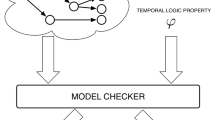Abstract
The aim of the work is to provide a language to reason about Closed Interactions, i.e. all those situations in which the outcomes of an interaction can be determined by the agents themselves and in which the environment cannot interfere with they are able to determine. We will see that two different interpretations can be given of this restriction, both stemming from Pauly Representation Theorem. We will identify such restrictions and axiomatize their logic. We will apply the formal tools to reason about games and their regulation.
Similar content being viewed by others
References
Abdou, J., & Keiding, H. (1991). Effectivity functions in social choice. In Theory and decision library C (Vol. 8). Dordrecht: Kluwer Academic Publishers.
Alur R., Henzinger T.A., Kupferman O. (2002) Alternating-time temporal logic. Journal of the ACM 49(5): 672–713
Blackburn, P., de Rijke, M., & Venema, Y. (2001). Modal logic. Cambridge Tracts in Theoretical Computer Science (Vol. 53). Cambridge: Cambridge University Press.
Borgo, S. (2007). Coalitions in action logic. Proceedings of IJCAI 2007 (pp. 1822–1827). Hyderabad, India.
Broersen, J., Meyer. J. J. Ch., Mastop, R., & Turrini P. (2008). A deontic logic for socially optimal norms. In Proceedings of ninth international workshop on deontic logic in computer science, Berlin: Spriger.
Chellas B. (1980) Modal logic: An introduction. Cambridge University Press, London
Coleman, K. G. (2004). Computing and moral responsibility. Stanford Encyclopedia of Philosophy.
Conte, R., & Paolucci, M. (2004) Responsibility for societies of agents. JASSS, http://jasss.soc.surrey.ac.uk/7/4/3.html.
Grossi D., Royakkers L., Dignum F. (2007) Organizational structure and responsibility. Artificial Intelligence and Law 12(3): 223–249
Hansen, H. H. (2003). Monotonic modal logics. Master Thesis, Universiteit van Amsterdam.
Hansen, H. H., & Pauly, M. (2002). Axiomatising nash-consistent coalition logic. In Proceedings of JELIA 2002, pp. 394–406.
Harel D. (1984) Dynamic logic. In: Gabbay D., Guenther F. (eds) Handbook of philosophical logic volume II—extensions of classical logic. D. Reidel Publishing Company, Dordrecht, The Netherlands
Horty J. (2001) Deontic logic and agency. Oxford University Press, Oxford
Liu, F. (2008). Changing for the better: Preference dynamics and agent diversity. PhD Thesis, ILLC Dissertation Series.
Osborne M., Rubinstein A. (1994) A course in game theory. The MIT Press, Cambridge
Parikh, R. (1985). The logic of games and its applications. In Selected papers of the international conference on “foundations of computation theory” on Topics in the theory of computation (pp. 111–139). Sweden: Borgholm.
Pauly, M. (2001). Logic for social software. PhD thesis, ILLC Dissertation Series.
Pauly M, Parikh R. (2003) Game logic—an overview. Studia Logica 75(2): 165–182
van Ditmarsch, H., van der Hoek, W., & Kooi, B. (2007). Dynamic epistemic logic. In Synthese library (Vol. 337). Berlin: Springer.
von Wright G.H. (1972) The logic of preference reconsidered. Theory and Decision 3: 140–169
von Wright G.H. (1980) Freedom and determination. North Amsterdam, Holland Publishing Co
Author information
Authors and Affiliations
Corresponding author
Rights and permissions
About this article
Cite this article
Broersen, J., Mastop, R., Meyer, JJ. et al. Determining the environment: a modal logic for closed interaction. Synthese 169, 351–369 (2009). https://doi.org/10.1007/s11229-009-9550-8
Received:
Accepted:
Published:
Issue Date:
DOI: https://doi.org/10.1007/s11229-009-9550-8




